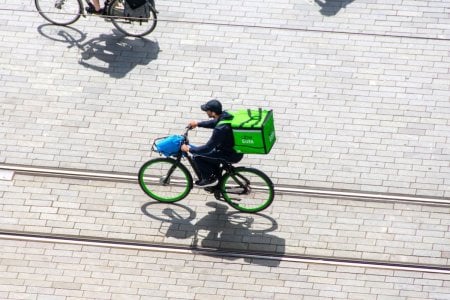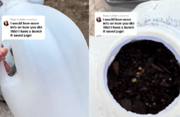Terrifying truth revealed! Aussie woman sheds light on the dark side of Uber Eats delivery
By
Seia Ibanez
- Replies 7
It might be convenient, but is it safe? That's the question on the minds of many seniors after a young Aussie woman recently shared her 'scary' experience with Uber Eats.
Content creator 'Lillith' was staying in a hotel in Perth when she ordered food to be delivered to her hotel lobby. After waiting an hour, she received a notification that her driver had arrived.
Except he hadn't. When she went to the designated spot inside the hotel, there was no driver to be found.
Then, she went outside and saw a car parked at the end of the alleyway – and it was there that she faced the terrifying truth.
'Uber is showing me I'm going to have one man that is in a car and they're going to meet me inside of my lobby where I'm on camera. But I have these two dudes honking at me to come out. Like, surely that's not safe,' she said online.
Unfortunately, Lillith wasn't the only one faced with such an unnerving situation. In fact, many of her commenters shared their own stories of uncomfortable Uber Eats deliveries.
One person recalled how they faced a similar problem, they had reported the issue and had the order re-sent. Another wrote: 'Girls be safe. I’m not leaving the lobby.'
It later became clear that Lillith's deliverymen had been disregarding company regulations and collecting multiple orders to make more money.
Uber Eats responded to the uproar by reinforcing their commitment to safety: 'Safety is our top priority and we have robust processes and cutting edge features built into our technology to support the safety of everyone who uses our app.'
While Lillith's unnerving encounter may be many Uber Eats users' worst nightmare come to life, it is not a one-off incident across the globe. Concerns about safety breaches with food deliveries make headlines time and time again, casting doubt on the overall security of these delivery services.
In 2019, in a harrowing incident reported amidst the hustle and bustle of New York City, a woman claimed she was assaulted by a DoorDash delivery man. The delivery person allegedly got aggressive when she complained about a delayed order. Although the company responded promptly and deactivated the accused delivery person’s access to the platform, the incident raised questions about the safety behind these apps.
In India, a similar incident unfolded with a Zomato delivery partner assaulting a female customer for complaining about a late delivery. In addition to physical assault, customers sometimes face other forms of harassment like intimidation, which sends a chilling reminder of the vulnerability one can experience.
Beyond physical attacks, customers have raised issues about privacy amid multiple data breaches. In 2020, a Domino's India data breach led to the personal details of about 18 orders ending up on the dark web. In a digital age where app usage is commonplace, such instances serve as urgent wake-up calls about data privacy concerns on these platforms.
It's quite clear that while technological advancements have made ordering food more accessible than ever, these safety breaches remain alarming concerns. However, not all is gloomy as these shocking instances have resulted in a significant tightening of security and safety processes by food delivery companies.
More rigorous background checks have been introduced, and most companies have established well-defined channels for complaints and immediate resolution.

The takeaway from Lillith's story? Our safety is a top priority, no matter what time of day it is.
When it comes to at-door deliveries, SDC members are advised to be extra careful. Make sure you request the driver meet you OUTSIDE the hotel or house in a well-lit area (ideally with CCTV coverage), and that if you are ever faced with a 'real-life' Uber issue, don't hesitate to report your concerns to customer support.
Content creator 'Lillith' was staying in a hotel in Perth when she ordered food to be delivered to her hotel lobby. After waiting an hour, she received a notification that her driver had arrived.
Except he hadn't. When she went to the designated spot inside the hotel, there was no driver to be found.
Then, she went outside and saw a car parked at the end of the alleyway – and it was there that she faced the terrifying truth.
'Uber is showing me I'm going to have one man that is in a car and they're going to meet me inside of my lobby where I'm on camera. But I have these two dudes honking at me to come out. Like, surely that's not safe,' she said online.
Unfortunately, Lillith wasn't the only one faced with such an unnerving situation. In fact, many of her commenters shared their own stories of uncomfortable Uber Eats deliveries.
One person recalled how they faced a similar problem, they had reported the issue and had the order re-sent. Another wrote: 'Girls be safe. I’m not leaving the lobby.'
It later became clear that Lillith's deliverymen had been disregarding company regulations and collecting multiple orders to make more money.
Uber Eats responded to the uproar by reinforcing their commitment to safety: 'Safety is our top priority and we have robust processes and cutting edge features built into our technology to support the safety of everyone who uses our app.'
While Lillith's unnerving encounter may be many Uber Eats users' worst nightmare come to life, it is not a one-off incident across the globe. Concerns about safety breaches with food deliveries make headlines time and time again, casting doubt on the overall security of these delivery services.
In 2019, in a harrowing incident reported amidst the hustle and bustle of New York City, a woman claimed she was assaulted by a DoorDash delivery man. The delivery person allegedly got aggressive when she complained about a delayed order. Although the company responded promptly and deactivated the accused delivery person’s access to the platform, the incident raised questions about the safety behind these apps.
In India, a similar incident unfolded with a Zomato delivery partner assaulting a female customer for complaining about a late delivery. In addition to physical assault, customers sometimes face other forms of harassment like intimidation, which sends a chilling reminder of the vulnerability one can experience.
Beyond physical attacks, customers have raised issues about privacy amid multiple data breaches. In 2020, a Domino's India data breach led to the personal details of about 18 orders ending up on the dark web. In a digital age where app usage is commonplace, such instances serve as urgent wake-up calls about data privacy concerns on these platforms.
It's quite clear that while technological advancements have made ordering food more accessible than ever, these safety breaches remain alarming concerns. However, not all is gloomy as these shocking instances have resulted in a significant tightening of security and safety processes by food delivery companies.
More rigorous background checks have been introduced, and most companies have established well-defined channels for complaints and immediate resolution.
Key Takeaways
- An Australian woman has shared her frightening experience when she was forced to pick up her Uber Eats delivery from 'two strange men' in an alleyway.
- The customer expressed concern and fear as the two men were not the registered drivers indicated by the Uber app.
- There has been criticism online, with many lamenting the potential danger in the incident, irrespective of the time of day.
- In response to the concerns, Uber Eats indicated that they have robust processes and safety measures in place, with a support team including experienced former law enforcement professionals available.
The takeaway from Lillith's story? Our safety is a top priority, no matter what time of day it is.
When it comes to at-door deliveries, SDC members are advised to be extra careful. Make sure you request the driver meet you OUTSIDE the hotel or house in a well-lit area (ideally with CCTV coverage), and that if you are ever faced with a 'real-life' Uber issue, don't hesitate to report your concerns to customer support.








